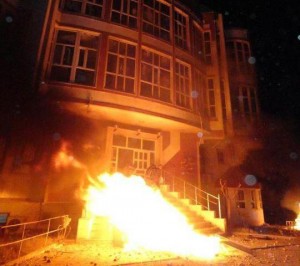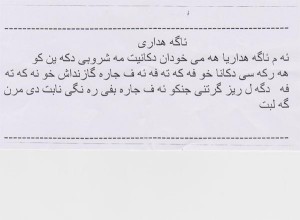Während Tunesien kaum ein Jahr nach dem Beginn der Revolte mit Moncef Marzouki einen ehemaligen Dissidenten, einen säkularen Menschenrechtler als Präsidenten hat, macht Ägypten weiter Sorgen. Mir gefällt Marzoukis Wahlspruch auf seiner Website: „Il est idiot de vouloir changer le monde, mail il est criminel de ne pas l’essayer.“ Hoffen wir, dass er nicht der neue Bazargan wird. Aber bisher sieht es in Tunesien nicht so schlecht aus. Schwer vorstellbar, dass sich dort die ohnehin moderateren Islamisten der Ennahda von Rashid Ghannouchi zu selbstmörderischen Forderungen hinreißen lassen würden, man brauche nun getrennte Strände für Männer und Frauen, ein allgemeines Alkohol- und Bikiniverbot und dergleichen. Für den Tourismus, eine der Lebensadern Tunesiens, wäre das tödlich.
In Ägypten spielen einige der siegreichen Muslimbrüder und noch mehr die Salafisten öffentlich mit solchen Gedanken. Der Rückgang des Tourismus um 35 Prozent im letzten Jahr wird sich fortsetzen, wenn die Verhüllten und die Bärtigen ans Ruder kommen sollten.
Auf dem sehr lesenswerten Blog The Arabist ist ein Bericht von AP dokumentiert, der die Lust von Teilen der MB und der Salafisten an der Kulturrevolution belegt:
Islamists are dominating Egypt’s elections and some of them have a new message for tourists: welcome, but no booze, bikinis or mixed bathing at beaches, please.
That vision of turning Egypt into a sin-free vacation spot could spell doom for a key pillar of the economy that has already been badly battered by this year’s political unrest.
„Tourists don’t need to drink alcohol when they come to Egypt; they have plenty at home,“ a veiled Muslim Brotherhood candidate, Azza al-Jarf, told a cheering crowd of supporters on Sunday across the street from the Pyramids.
„They came to see the ancient civilization, not to drink alcohol,“ she said, her voice booming through a set of loudspeakers at a campaign event dubbed „Let’s encourage tourism.“ The crowd chanted, „Tourism will be at its best under Freedom and Justice,“ the Brotherhood’s party and the most influential political group to emerge from the fall of Hosni Mubarak
(…)
Also, clerics like Yasser Bourhami, influential among hard-line Salafis, are presenting ideas for restrictions on tourism. Bourhami calls it „halal tourism,“ using the term for food that is ritually fit under Islamic law.
„A five-star hotel with no alcohol, a beach for women — sisters — separated from men in a bay where the two sides can enjoy a vacation for a week without sins,“ he said in an interview with private television network Dream TV. „The tourist doesn’t have to swim with a bikini and harm our youth.“
A leading member of Al-Nour, Tarek Shalaan, stumbled through a recent TV interview when asked about his views on the display of nude pharaonic statues like those depicting fertility gods.
„The antiquities that we have will be put under a different light to focus on historical events,“ he said, without explaining further.
He also failed to explain whether hotel reception clerks will have to start demanding marriage certificates from couples checking in together.
„Honestly, I don’t know the Shariah position, so I don’t want to give an answer,“ he said.
Nach dem ersten Schock über die Gewinne der MB, vor allem aber der Salafisten, hat die Suche nach den Gründen begonnen. Mir erscheint bisher ein Bericht von David Kirkpatrick in der NYT am überzeugendsten. Kirkpatrick beschreibt die Salafisten als erfolgreiche populistische Partei, die gezielt den Hass auf die liberale und säkularistische Elite schürt, die das Volk vergessen hat oder auf es herabschaut:
But when a few hundred men gathered last week in a narrow, trash-strewn lot between the low cinderblock buildings of this village near Cairo, what they heard from the sheiks, known as Salafis, was a blistering populist attack on the condescension of the liberal Egyptian elite that resonated against other Islamists as well.
“They think that it is them, and only them, who represent and speak for us,” Sheik Shaaban Darwish said through scratchy speakers. “They didn’t come to our streets, didn’t live in our villages, didn’t walk in our hamlets, didn’t wear our clothes, didn’t eat our bread, didn’t drink our polluted water, didn’t live in the sewage we live in and didn’t experience the life of misery and hardship of the people.”
“Brothers,” he continued, “we, the Salafis, the founders of Al Nour Party, were part of the silent majority.”
Die Muslimbrüder sind sehr viel mehr schon eine Mittelstandspartei geworden. Sie repräsentieren Ärzte, Ingenieure, Studenten, Geschäftsleute – lauter Menschen, die etwas zu verlieren oder zu gewinnen haben. Die Salafisten kümmern sich um die Vergessenen.
Kirkpatrick schreibt:
A closer examination of the Salafi campaigns, however, suggests their appeal may have as much to do with anger at the Egyptian elite as with a specific religious agenda. The Salafis are a loose coalition of sheiks, not an organized party with a coherent platform, and Salafi candidates all campaign to apply Islamic law as the Prophet Muhammad did, but they also differ considerably over what that means. Some seek within a few years to carry out punishments like cutting off the hands of thieves, while others say that step should wait for the day when they have redistributed the nation’s wealth so that no Egyptian lacks food or housing.
But alone among the major parties here, the Salafi candidates have embraced the powerful strain of populism that helped rally the public against the crony capitalism of the Mubarak era and seems at times to echo — like the phrase “silent majority” — right-wing movements in the United States and Europe.
“We are talking about the politics of resentment, and it is something that right-wing parties do everywhere,” said Shadi Hamid, director of research at the Brookings Doha Center in Qatar. They have thrived, he said, off the gap between most Egyptians and the elite — including the leadership of the Muslim Brotherhood — both in lifestyle and outlook.
Natan Field schreibt auf The Arabist, er sei nicht sehr überrascht gewesen über den Erfolg der Salafisten. Die populärsten TV-Kanäle seien bereits seit Jahren in den Händen der Salafi-Scheichs gewesen. Auch hätten sie nie die Politik gemieden, wie es die Legende vom salafistischen Quietismus will. Ihr Programm sei immer eminent politisch gewesen, nur nicht im den Termini der Mubarak-Herrschaft und des Widerstands gegen sie. Das macht sie jetzt gerade in der Zeit des Umbruchs so glaubwürdig. Field hält es für einen Fehler der Liberalen zu glauben, die Salafis seien eine fünfte Kolonne Saudi-Arabiens. Gewiß gebe es viele Spenden von dort (Zakat), aber der ägyptische Salafismus sei eine genuin einheimische Grassroots-Bewegung.
Wohin das alles führt, ist schwer zu sagen. Eien regierungsfähige Koalition mit diesen Leuten ist schwer vorstellbar. Sie würde das Land mit Sicherheit in den Abgrund führen, der sich jetzt schon auftut in Form einer drohenden wirtschaftlichen Katastrophe.
Jedenfalls scheint es, als würden die entscheidenden politischen Debatten über die Zukunft der arabischen Revolution zwischen verschiedenen Lagern des Islamismus ausgetragen (und nicht zwischen Säkularen und Religiösen). Hier ein Beispiel dafür, dass dieser Prozess schon begonnen hat. Der einflußreiche islamistische Intellektuelle Fahmi Howeidy schreibt sehr zugespitzt über einen salafistischen Kandidaten, der in Alexandria eine Stichwahl gegen einen Muslimbruder verloren hat, nachdem er zuerst haushoch in Führung gelegen hatte (Übersetzung auf Arabist.net):
I do not know Eng. al-Shahat personally, but whenever I heard him or followed him speaking in the media, I felt like he was launching a personal insult at me in my capacity as a researcher concerned with Islamic issues. When I learned of the final tally in the second round of elections in the al-Nuzha electoral district in Alexandria, I said that voters’ aversion to him was a sort of punishment vote against him for the statements he keeps spewing, especially as of late. This is a story that deserves to be told.
In the first round of the election, Eng. al-Shahat captured about 191,675 votes, while his opponent, the independent lawyer Hosny Duwiedar — who received support from the Muslim Brotherhood — won 144,296 votes. He was known as an extremist ever since his days as a university student. We discovered him when he started appearing on satellite channels, and some newspapers vied with each other to shed light on him due to his perverse views that were considered rich game for those who like to hunt and provoke.
This was most evident when the host of a populist TV show invited him on and barraged him with questions that all focused on his views on people’s private lives, states of dress and undress, the hijab and the niqab, bathing suits, cabarets, alcohol, gambling, entertainment, etc. Our friend responded to all these questions in the negative, to the extent that it seemed like he wanted to overturn everything in society without any gradualism, moderation or compassion. The show’s host did not ask him about anything that concerns the masses like unemployment, education, health or development, but rather confined him to the problems of the elite and the interests of the upper class — which are the interests that most of the media still focuses on at the present time. The man subsequently attacked democracy and declared it to be bid’a, and he went back to talking about growing out beards, closing down banks, and banning bathing suits. We didn’t hear a word from him about what he could accomplish to benefit God’s creation. It was as if he didn’t want to leave the realm of bans and prohibitions, and give people hope in permissible and recommended acts (those which are encouraged or desirable).
Man kann nur hoffen, dass diese Debatten sich fortsetzen. Am Ende wird es nicht die schockierte Reaktion der Weltöffentlichkeit sein, die Ägyptens Islamisten auf einen mittleren Weg führt, wenn denn so etwas denkbar ist. Nur Kritik und Entzauberung von innen her können das leisten.


